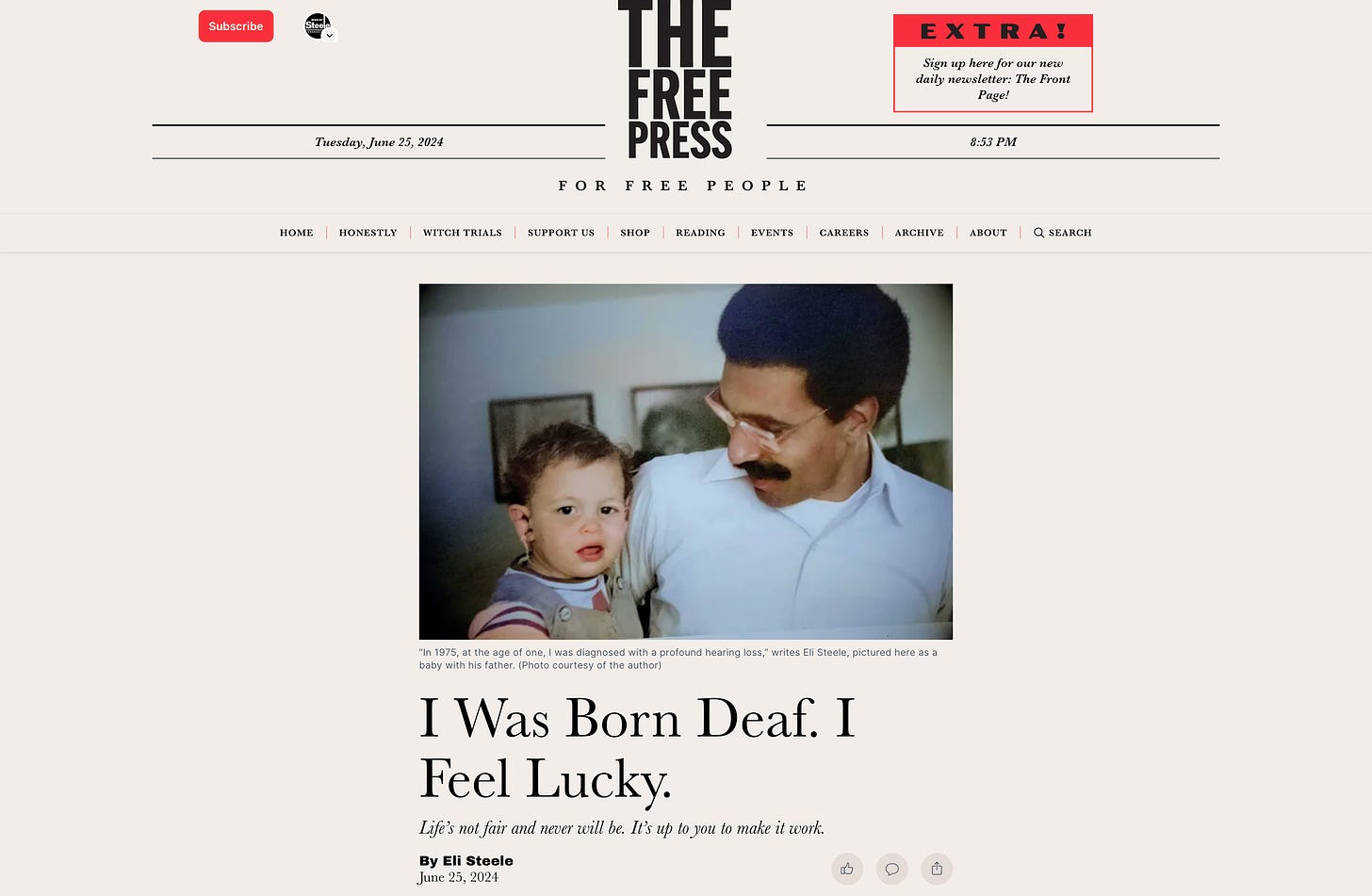Good evening all,
I rarely write in detail about my personal experiences being deaf these days. But a week ago, after a podcaster ghosted me after finding out I was deaf, I wrote my thoughts in a X (Twitter) thread. Last week, The Free Press asked me to flesh out the thread into a full article where I talk about the challenges of growing up deaf and what it was like to go from hearing aids to the cochlear implant. All I can say is that I wouldn’t change a thing in my life for I met many great people and had so many unforgettable experiences. Most of all, I learned how lucky I was to live in today’s America.
Here is an excerpt:
Recently, I was invited onto a podcast to discuss my latest documentary, Killing America. Emails were exchanged; the date was set. Then I mentioned that I would need to be able to lip-read during the recording: I’m deaf, and sometimes it is difficult for me to understand a stranger’s voice.
What happened next: I was ghosted.
A friend asked if I was angry. To my surprise, I said no.
My deafness taught me early that life is unfair. It just is. In 1975, at the age of one, I was diagnosed with a profound hearing loss. My deafness was bilateral, meaning both ears were affected, and the loss level for both was 95 dB (decibels), meaning I couldn’t hear any sound other than something like a gun firing near my ear, and even that was muffled. I had been born into a world of silence.
Back then, a lot of people assumed I would never learn to speak. My parents believed otherwise; thanks to them, the good people who invented technologies just in time for me to benefit from them, and a lot of hard work, I found my voice.
In my mid-twenties, I got a cochlear implant, which improved my hearing drastically. I still tend to rely on lip-reading, although I can get by without it. I know that makes it harder for podcasts to host me. Several months ago, I was invited onto Denver’s popular Ross Kaminsky Show to discuss a piece I had written about Claudine Gay for The Free Press. The interview was conducted over video, and the moment it started I was thrown off by the two-second delay between Ross’s voice and his lips. I bombed.
When Megyn Kelly hosted my father and I on her podcast to discuss our documentary, What Killed Michael Brown?, I didn’t know until the last second that I would not see her face—the conversation was audio-only. I have never concentrated so hard in my life. It turned out to be one of my best interviews.
I appreciate those podcasters, such as Benjamin Boyce, who have gone to the effort of adding captions after interviewing me. I have a deaf accent, because I couldn’t hear sounds in the mid- to high-frequency range when I was learning to speak, including some of the more crucial consonants. Sometimes I leave s off the end of plural words, for instance, and I cannot pronounce the difference between fat and vat.
Do I wish my life was easier? That I could speak easily, with a voice like my father’s? Sure. Yet the fact that I can do these podcasts at all feels like a miracle of sorts. That’s why, despite being ghosted, I still feel blessed: if I had been born a couple of decades earlier, in a different place, or with different parents, I would never have had the opportunity to speak at all, let alone to thousands of people…
To read the rest, please click here.
Would love to know what you think. Also, very much enjoyed the emails I got regarding the last piece on Condeleeza Rice. Thank you for that.
My best,
Eli





We are all given gifts and challenges, Eli. You have chosen to use yours in a way that serves the good, rather than stewing in bitterness and resentment, and we are all richer for it. Keep up the good work and God bless. You are truly making a difference in the world.
Eli, thank you for sharing yourself with us. We all are given various gifts but we all get to our life's work in very diverse ways. Your sharing is a motivator for many of your readers and we are all much better people by reading and/or listening to all your experiences. At 72, your sharing is still helping me be a much better person.